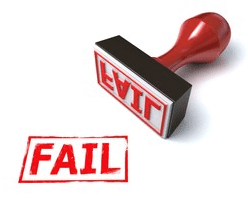 There are probably few things I say in a classroom that raises the ire of instructors more than “You’re training your members to fail.” I understand why they wouldn’t want to hear that. No instructor wants a member to fail. Even more so, no instructor wants to be implicated for being the one responsible for the failure. This is especially true when failure results in a casualty. Nonetheless, it’s happening more often than I’d like to see. How do I know? Let me explain.
There are probably few things I say in a classroom that raises the ire of instructors more than “You’re training your members to fail.” I understand why they wouldn’t want to hear that. No instructor wants a member to fail. Even more so, no instructor wants to be implicated for being the one responsible for the failure. This is especially true when failure results in a casualty. Nonetheless, it’s happening more often than I’d like to see. How do I know? Let me explain.
Training for failure
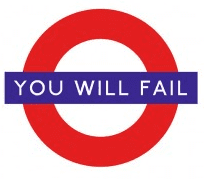 The concept of training for failure is rooted in the notion that field performance of tasks mirror their training. You’ve heard the phrase “We are creatures of habit.” There is nothing that makes that statement more accurate than stress. As stress levels increase, the brain transitions from a rational/logical information processor to an intuitive/instinct based processor.
The concept of training for failure is rooted in the notion that field performance of tasks mirror their training. You’ve heard the phrase “We are creatures of habit.” There is nothing that makes that statement more accurate than stress. As stress levels increase, the brain transitions from a rational/logical information processor to an intuitive/instinct based processor.
This is when performance becomes automatic and driven by training and habits. Much of the knowledge and many of the skills needed by responders in an emergent situation must be recalled and applied almost instantly. Training is the foundation that sets you up for success… or failure. The speed and accuracy of your recall from memory is key.
Types of memory
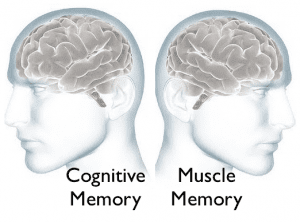 You have many types of memory. More, in fact, that I want to take the time to write about in this article. Two memories I want to mention are cognitive memory and muscle memory. Cognitive memory is your storage and recall of information (e.g., names, phone numbers, email addresses, etc.). Committing cognitive information to memory through repetition improves your chances of recalling information quickly and accurately. Think of your recall of the multiplication tables you learned in elementary school as a good example.
You have many types of memory. More, in fact, that I want to take the time to write about in this article. Two memories I want to mention are cognitive memory and muscle memory. Cognitive memory is your storage and recall of information (e.g., names, phone numbers, email addresses, etc.). Committing cognitive information to memory through repetition improves your chances of recalling information quickly and accurately. Think of your recall of the multiplication tables you learned in elementary school as a good example.
The second memory important to this discussion is muscle memory. This memory is your storage and recall of movement (e.g., how to ride a bicycle, how to brush your teeth, etc.). Similar to cognitive memory, committing muscle movements to memory through repetition improves your chances of recalling the physical movements to perform a physical task quickly and accurately. Think of your ability to play any sport with reasonable competency as an example. Practice trains your muscles on how to perform accurately when you’re ‘in the game.’
Cognitive memory failures
 There are many ways in which our cognitive memory can be an asset during high-stress, high-consequence events. This is especially true when time is compressed and we are forced to recall things quickly. In the mayhem of an emergency is not the place to be tapping your finger against the side of your head thinking “What was the third step in that five-step process we learned about how to handle this situation?” This is where repetition in learning becomes critical. However, if you want to improve the ability to recall the cognitive lesson in an emergency situation, then learn the lesson in a simulated environment as similar to the real environment as possible.
There are many ways in which our cognitive memory can be an asset during high-stress, high-consequence events. This is especially true when time is compressed and we are forced to recall things quickly. In the mayhem of an emergency is not the place to be tapping your finger against the side of your head thinking “What was the third step in that five-step process we learned about how to handle this situation?” This is where repetition in learning becomes critical. However, if you want to improve the ability to recall the cognitive lesson in an emergency situation, then learn the lesson in a simulated environment as similar to the real environment as possible.
While it may be impractical, maybe even impossible, to train responders on everything they need to know in a field setting, it is entirely possible to practice recall of the information they are taught in a classroom in a field setting. Practice and recall in a simulated environment that mirrors the stress of the real work environment will improve recall of the information when it may be needed most… in the same environment it was practiced in.
Muscle memory failures
 Like cognitive memory, there are many ways in which muscle memory can be an asset to emergency responders operating in high-risk, high-consequence environments. And like cognitive recall, the compression of time and the immediate need for action can require the muscles to react quickly, dare I say it – instinctively – to a situation. One of the biggest ways I see instructors training responders to fail is by giving verbal instructions for physical tasks without requiring responders to physically perform a task. It goes something like this: “When you get out there in the field, remember that when confronted with this situation, you’ll want to _______ (fill in the blank with whatever the physical task is). There is a fundamental flaw with this type of learning.
Like cognitive memory, there are many ways in which muscle memory can be an asset to emergency responders operating in high-risk, high-consequence environments. And like cognitive recall, the compression of time and the immediate need for action can require the muscles to react quickly, dare I say it – instinctively – to a situation. One of the biggest ways I see instructors training responders to fail is by giving verbal instructions for physical tasks without requiring responders to physically perform a task. It goes something like this: “When you get out there in the field, remember that when confronted with this situation, you’ll want to _______ (fill in the blank with whatever the physical task is). There is a fundamental flaw with this type of learning.
Muscles learn from muscle movement. Muscles don’t learn from verbal instructions. The only way for you to learn how to perform a physical task with any kind of competency is to move! To physically perform the task. An instructor can talk to you all day long about what you are supposed to do but until your muscles move in practice, they’re not learning. Then, when your muscles do move in practice, it’s important the movements are right.
A hypothetical example
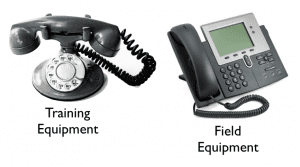 Let’s use an example of a responder who learns how to perform a task using one type of equipment in training but the training division is using “old” equipment because they get the hand-me-downs that are no longer in-service. So the recruit learns cognitive memory (i.e., the recall of the steps needed to complete the task) and muscle memory (i.e., the physical movements necessary to complete that task using the equipment provided). Unfortunately, however, the field equipment does not match the training equipment. The higher the stress, the more likely the responder is to revert back to memory and habits taught in training. This will either cause errors in performance or slow the task as the mind tries to reconcile the differences between how the responder was trained and how to perform in the real scenario. Compounding the situation, both delays and errors can occur.
Let’s use an example of a responder who learns how to perform a task using one type of equipment in training but the training division is using “old” equipment because they get the hand-me-downs that are no longer in-service. So the recruit learns cognitive memory (i.e., the recall of the steps needed to complete the task) and muscle memory (i.e., the physical movements necessary to complete that task using the equipment provided). Unfortunately, however, the field equipment does not match the training equipment. The higher the stress, the more likely the responder is to revert back to memory and habits taught in training. This will either cause errors in performance or slow the task as the mind tries to reconcile the differences between how the responder was trained and how to perform in the real scenario. Compounding the situation, both delays and errors can occur.
In the real world
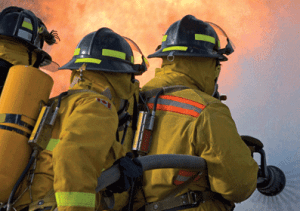 I have discussed the problem of training for failure with thousands of responders during my Mental Management of Emergencies programs. I never have to look far or dig deep to find real examples for how responders are trained to fail. The reactions I get can be a real mixed bag. As I provide the real life examples using participants in my class some instructors begin to look as though they’ve just seen a ghost. Some are stunned into silence. Some feverishly write down notes. Sadly though, some instructors want to defend their training methodologies and practices.
I have discussed the problem of training for failure with thousands of responders during my Mental Management of Emergencies programs. I never have to look far or dig deep to find real examples for how responders are trained to fail. The reactions I get can be a real mixed bag. As I provide the real life examples using participants in my class some instructors begin to look as though they’ve just seen a ghost. Some are stunned into silence. Some feverishly write down notes. Sadly though, some instructors want to defend their training methodologies and practices.
Some instructors, on the defensive, say things to me like “We don’t have the time to train the way you are proposing.” I cannot argue with that response. I don’t claim to know the time constraints an instructor is under in his or her individual organization. All I’m simply saying is training in ways that do not mirror real life scenarios is a set-up for failure. If lack of time to train properly does not fix the problem, it simply explains why the responder was trained to fail.
In some instances, time is not the culprit in training to fail. Rather, it is based on the instructor’s lack of knowledge about how the brain learns and how information is recalled, especially under stress. There is a fundamental flaw in the educational methodologies curriculum in most programs I have seen. The programs fail to teach instructors the neuroscience behind how the brain learns and recalls. This can, in turn, impact how the instructor teaches students.
Chief Gasaway’s Advice
 I have several tangible pieces of advice on how to combat training for failure. Much of what I have to say about this runs counter to the established paradigms of instructors so I can only wish (with fingers crossed) that instructors will let down their protective guards and take this advice with its intended benefit – to help you improve the safety of your responders.
I have several tangible pieces of advice on how to combat training for failure. Much of what I have to say about this runs counter to the established paradigms of instructors so I can only wish (with fingers crossed) that instructors will let down their protective guards and take this advice with its intended benefit – to help you improve the safety of your responders.
First, stop judging the performance of others when they do things that seem inappropriate. I once took a class where an instructor showed video after video of responders doing what, in his words, were ‘stupid things.’ I watched and listened with a heavy heart. For not only was this instructor judging the performance of others harshly and unfairly, he was also teaching his students to do the same thing. The fact is, when you are judging the performance of others you cannot, simultaneously, be the student.
As I sat there and watched this program I so much wanted to blurt out “So why do you think those responders thought that what they were doing at that moment in time made sense… or it was the right thing to do?” I’m sure I would have stunned the room into silence and embarrassed the instructor which would have, in turn, earned me an angered response. No good would have come from that.
The lesson here is to stop judging others when things go wrong and start seeking to understand why it made sense to them to be doing what they were doing. They were either trained to do it the way they were doing it or they weren’t trained at all and were improvising based on their assumption that it would work. No responder performs unsafe things on purpose. Understanding why and how bad things happen begins when we stop judging others.
When the class was over I waited around for the students to leave and then I approached the instructor and asked him why he thought those responders in his videos were doing the things they did. His response floored me. He said “Because they’re stupid (expletive).” I didn’t know what to say. I mustered the courage to ask my second question. Did he ever consider the possibility those firefighters were trained to fail. “If they were trained to do what they did their instructors should be fired” came the indignant response.
Should an instructor whose never been taught about how the brain learns be fired for teaching the best way they know how? That doesn’t seem very fair to me. An instructor training responders to fail is likely only training others the same way they’d been trained.
The second solution I am going to offer is to invite an independent evaluation of your training program. Why independent? Because sometimes you’re too close to the problem to see the problem. If you knew you were training responders to fail, you’d change the way you trained your responders. You wouldn’t need someone to point it out to you. The key to this solution is to ensure the evaluator you select is not from your agency and they understand how responders are trained to fail. Now, before you think this paragraph is some kind of informercial to have you hire me to do an evaluation of your department… it’s not. There are plenty of resources available to you and some may be local to you. The important thing is you begin to see where the shortcomings are in your training program and start to fix them.
The third solution I am going to offer is to avoid the trap of believing you can train responders how to do something one way in training and then tell them, or expect them, to do it differently when they are in the field. I hear this often. Recruits are told “We’re going to train you how we’re required to here in the academy but when you get out into the street they’ll teach you how it’s really done.” Wouldn’t it make better sense to teach how it’s really done in the academy? Why the disconnect? It’s either the academy’s way of teaching has not kept up with best practices used in the field or the field performance has drifted away from the best practices taught in the academy. Either way is a set-up for failure.
Discussions
 1. Discuss examples of how responders in your organization may have been trained to fail and tangible solutions on how to fix the problem.
1. Discuss examples of how responders in your organization may have been trained to fail and tangible solutions on how to fix the problem.
2. Locate some videos on the Internet of responders doing what seems to be ‘stupid’ things at emergency scenes. Instead of judging their performance, ask “Why did what they were doing make sense to them at that moment in time.” Seeking to understand the basis of behavior is where the real learning begins.
3. Discuss how to evaluate your training program to ensure your responders are being trained for success.
The mission of Situational Awareness Matters is simple: Help first responders see the bad things coming… in time to change the outcome.
Safety begins with SA!
_________________________________________________________________________________
Share your comments on this article in the “Leave a Reply” box below. If you want to send me incident pictures, videos or have an idea you’d like me to research and write about, contact me. I really enjoy getting feedback and supportive messages from fellow first responders. It gives me the energy to work harder for you.
Thanks,
Email: Support@RichGasaway.com
Phone: 612-548-4424
Facebook: www.facebook.com/RichGasaway
Facebook Fan Page: www.facebook.com/SAMatters
LinkedIn: Rich Gasaway
Twitter: @RichGasaway
YouTube: SAMattersTV
iTunes: SAMatters


Hey Rich,
Not to add complexity to your paradigm, but IQ has a big impact too. Some teachers will succeed with good students in spite of the teacher’s efforts.
I don’t have the research citation handy but a high IQ student could learn a new skill just by reading about it (thus imagining the skill). Next step down the IQ ladder could learn a skill by seeing it demonstrated. Below that someone needed to practice the skill to learn it (and I guess below that are both the folks who need to practice a skill many times or the folks who can never learn a skill). Communication between folks of +20 IQ points difference never reaches ‘full understanding’ of each other. Are your really building muscle memory with limited repititions (your hypothesis) or are you better communicating (by showing/doing/correcting) what is really expected of the student?
There is an empathy component to ‘reading’ your audience or selecting the audience to fit the presentation. Your example instructor ‘didn’t get’ your point.
You can delegate authority but not responsibility. Was it the training officer’s fault or the chief’s fault for making them the training officer.
Thanks for all you do!
Excellent points, Rich, I am so glad you brought up this subject to examine.
The irony of course is that in some instructors’ desire to teach their students not to repeat actions that were foolish, they end up inadvertently loading those decisions into their students’ minds. I’ve heard this referred to as ‘negative training’, and in our industry, obviously the results can be deadly.
I think also of the instructors who want to ‘take down’ the students who are performing well in exercises, and think that is going to teach humility. For example, during simulation-based exercises, if a student does not articulate searching a room, the instructor might be inclined to say that room was filled with “nuns and babies” (as a colleague of mine used to say). The missed search definitely should be called out during the critique/review (and, depending on the purpose of the exercise, may be grounds for failure), but I would disagree with slanting the whole exercise on the fly as a result of their mistake.
It’s not that the missed search should be ignored, but it is essential to build and encourage confidence in students. Mistakes on the fireground will always happen, and there will be consequences. However, I think we are training them to fail if we unfairly try to undermine their confidence in their skills and decisions.
Jonathan,
Thank you for sharing your experience with the readers. You make great points.
Ironically, while I am a big proponent for NOT training firefighters to fail, at some point, I actually want us to train firefighters to fail. I know, it sounds counterintuitive so let me explain.
We want firefighter to learn who to do their jobs flawlessly and repetitively. Get good at it and confident at it. Being able to do it forwards and backwards with one arm tied behind their backs so to speak.
But… then… when they get that good. We want to tell them that the next evolution is going to fail and then proceed to build complexity into the evolution so they experience failure. It is out of that failure that the brain “rewires” itself and they actually learn more. You’ve heard we learn more from our mistakes than the things we do right. It’s true! And by building failure into evolutions of VERY well-trained and VERY well-practiced firefighters, we are helping to make them resilient problem solver (able to work through novel problems better).
Rich
Dear Rich,
Thanks for your comments. Maybe I tried to make my point too subtly. I was not talking about intentionally making a difficult or unwinnable situation. I think there’s practical training value in seeing how students/trainees behave in such positions, both as a test of problem solving (as you point out) and of character, like the Kobayashi Maru. I was talking about holding back the inclination to ratchet up the difficulty arbitrarily, on the fly during an exercise, as a response to the person doing overall well. It is challenging to build confidence but avoid cockiness.
Rich,
Excellent article!
The message is slowly getting out. Your information is slowly making it’s way into my department and surrounding ones. There are several of us hosting classes, teaching from the perspective you outlined. I incorporate self imagery, self talk, H.O.T. with audible and visual distractors built into them, and in the lecture portion the students are told everything we are going to do … everything.
The premise is simple, if the military, commercial airlines industry, professional sports teams, the Olympic training facility, and law enforcement use these tactics … why shouldn’t we? The answer is simple … many instructors do not know the concepts. It’s not that they are dumb, or have low IQ’s, they just have not had the exposure … excuse me … the PROPER exposure to gain the proper understanding of training for “stress inoculation”.
It’s my experience that when the willing “hear” the information they listen with intent, as witnessed by the deadpan silence in the room, when all eyes and ears are listening and looking at you as you deliver the pathology of learning from frontal lobe to mid lobe with all the hormonal releases associated with it.
Ric,
Thanks for sharing your feedback. Indeed it is humbling for me to have a room of experienced fireground commanders looking stunned when I share my B.S. (Brain Science) with them. This stuff WILL save lives. Thank you for paying it forward and keeping the message moving along!
Rich